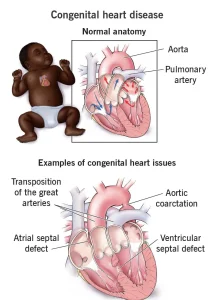Overview
Diagnosis
A congenital heart defect can be diagnosed during pregnancy or after birth. In many cases, signs of heart abnormalities are seen during a routine fetal ultrasound.
After birth, healthcare professionals may suspect a heart defect if a baby shows certain signs such as:
-
Growth delays
-
Bluish color changes on the lips, tongue, or nails
-
A heart murmur heard through a stethoscope
Most murmurs are harmless, but some may suggest an underlying heart defect.
Tests
Tests used to confirm or evaluate congenital heart defects include:
-
Pulse oximetry: Measures oxygen levels in the blood using a fingertip sensor. Low oxygen levels may indicate a heart or lung problem.
-
Electrocardiogram (ECG or EKG): Records the heart’s electrical activity and shows if it’s beating normally.
-
Echocardiogram: Uses sound waves to create moving images of the heart. A fetal echocardiogram may be done during pregnancy.
-
Chest X-ray: Shows heart and lung size and detects fluid buildup or enlargement.
-
Cardiac catheterization: A thin tube is inserted into a blood vessel and guided to the heart to assess blood flow and pressure. It may also be used for treatment.
-
Heart MRI: Creates detailed 3D images of the heart to assess structure and function, often used in adolescents and adults.
Treatment
Treatment depends on the type and severity of the heart defect. Some minor defects cause no long-term problems and may close naturally as a child grows. Others require immediate intervention.
Treatment options include:
-
Medications: To manage symptoms or complications, such as:
-
Blood pressure drugs (ACE inhibitors, ARBs, beta blockers)
-
Diuretics to remove excess fluid and ease heart strain
-
Anti-arrhythmic drugs to control irregular heartbeats
-
-
Cardiac catheterization: Minimally invasive procedures that can repair certain heart defects without open surgery.
-
Heart surgery: Open-heart or minimally invasive surgery may be needed to correct structural problems.
-
Heart transplant: In severe cases where repair isn’t possible.
-
Fetal cardiac intervention: A rare prenatal procedure to correct or prevent heart issues before birth.
Children with congenital heart defects often need long-term follow-up with a cardiologist to monitor heart health and manage potential complications throughout life.
Advertisement

